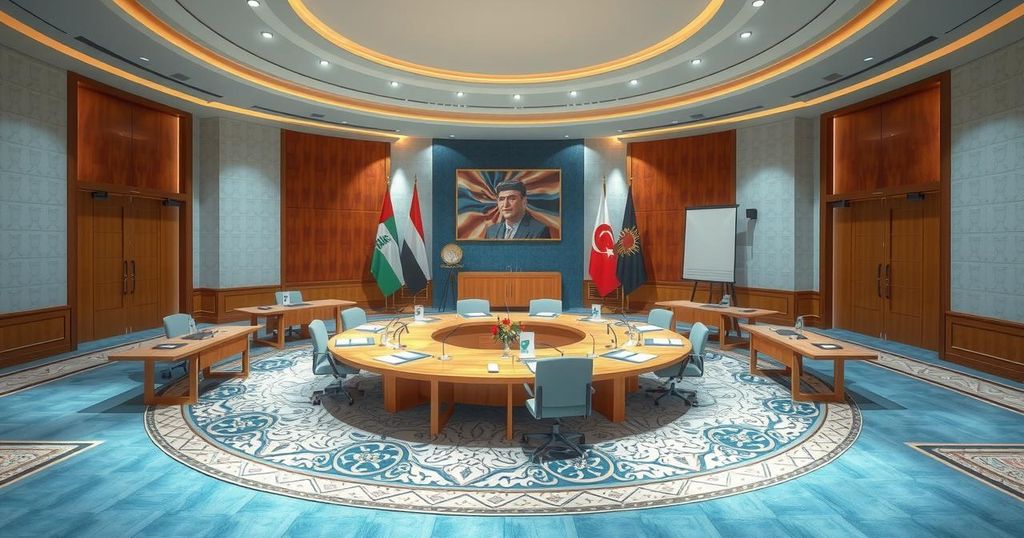U.S. Officials Optimistic Following Recent Nuclear Talks with Iran in Oman

U.S. and Iranian negotiators concluded talks on Iran’s nuclear program in Oman, agreeing to meet again to discuss details of a potential deal. Trump administration officials expressed cautious optimism, while Iran’s response was more restrained. The negotiations occur ahead of Trump’s Gulf visit, emphasizing the significance of diplomatic solutions amid ongoing regional challenges.
In a series of recent negotiations, United States and Iranian officials concluded another round of talks regarding Iran’s nuclear program, this time in Muscat, Oman. Lasting over three hours, the discussions ended with both sides agreeing to reconvene to clarify the finer points of a possible agreement, which has sparked cautious optimism within the Trump administration. Senior officials noted, “We are encouraged by today’s outcome and look forward to our next meeting, which will happen in the near future,” as they emphasized the intention to continue working through key technical details.
Iran’s foreign ministry spokesman, Esmaeil Baqaei, characterized the talks as “difficult but useful,” signaling a more tempered response from Tehran. He mentioned that Oman would coordinate future discussions, highlighting the important role the Gulf state plays in mediating these high-stakes negotiations. Some sources indicate that the dynamics of the dialogue are shifting positively, which could be pivotal for both sides—especially as both seem to seek a resolution.
President Trump is facing increasing pressure to secure a diplomatic victory as his administration grapples with complex issues in Gaza and Ukraine. The administration is reportedly keen on achieving a breakthrough, particularly as Iran seeks relief from sanctions that have severely impacted its economy. Recent ceasefires between U.S. forces and Iranian proxies in Yemen have also breathed new life into these discussions, according to insiders.
Top U.S. negotiator Steve Witkoff met with Iranian Foreign Minister Abbas Araghchi, while Omani Foreign Minister Sayyid Badr Al-Busaidi facilitated communications between the two parties. As Trump prepares for his visit to key Gulf nations, he is aiming to promote diplomatic solutions to Iran’s nuclear aspirations over military responses, although there seems to be confusion about what that entails.
In a recent interview, President Trump conveyed uncertainty around Iran maintaining a limited nuclear enrichment program for civilian purposes, which has created mixed signals from the administration. Witkoff has been more definitive, declaring that Iran’s enrichment capabilities represent a “red line” for the U.S. He stated, “No enrichment,” which implies dismantling enrichment facilities including Natanz, Fordow, and Isfahan.
Just last month, Secretary of State Marco Rubio had hinted that Iran could keep a civilian nuclear program but insisted that it must procure any enriched fuel from international sources. This raises questions regarding whether the ambiguity stems from indecision or is a strategic move to enhance the negotiations. Meanwhile, Iranian officials maintain that any right to domestic enrichment remains non-negotiable.
Since withdrawing from the landmark 2015 nuclear agreement, Trump’s administration has taken a harder stance on Iran. Under this deal, Iran’s enrichment was limited to 3.67%, which allowed for nuclear energy production, yet since its withdrawal, they have ramped up uranium enrichment to levels near 60%. According to the UN’s International Atomic Energy Agency, they now have enough material to potentially build six nuclear bombs if further enriched.
The current talks in Muscat are specifically honing in on Iran’s nuclear ambitions, with other pressing issues, such as missile technology and proxy activities, being reserved for later discussions. Witkoff has cautioned that introducing additional subjects could threaten the progress made thus far. With high stakes ahead, Iran’s nuclear ambitions are sure to remain central as Trump prepares to engage with leaders in Saudi Arabia, Qatar, and the UAE this week.
Amidst these developments, the Gulf states have shown increasing support for the ongoing nuclear discussions, a notable shift from their earlier concerns in 2015 when they perceived the U.S. negotiations as favoring Iran. Improved relations between Riyadh and Tehran highlight a changing mindset in the region, where economic interests are increasingly prioritized over prior tensions.
In summary, the latest round of U.S.-Iran nuclear talks in Oman has yielded cautious optimism from U.S. officials while prompting a measured response from Iran. With high-level meetings planned ahead of President Trump’s visit to the Gulf, both sides appear eager for some form of resolution. However, differences over issues like nuclear enrichment represent significant hurdles. The geopolitical landscape continues to evolve as Gulf nations adjust their strategies in light of shifting power dynamics, all while closely watching the unfolding negotiations.
Original Source: www.al-monitor.com





